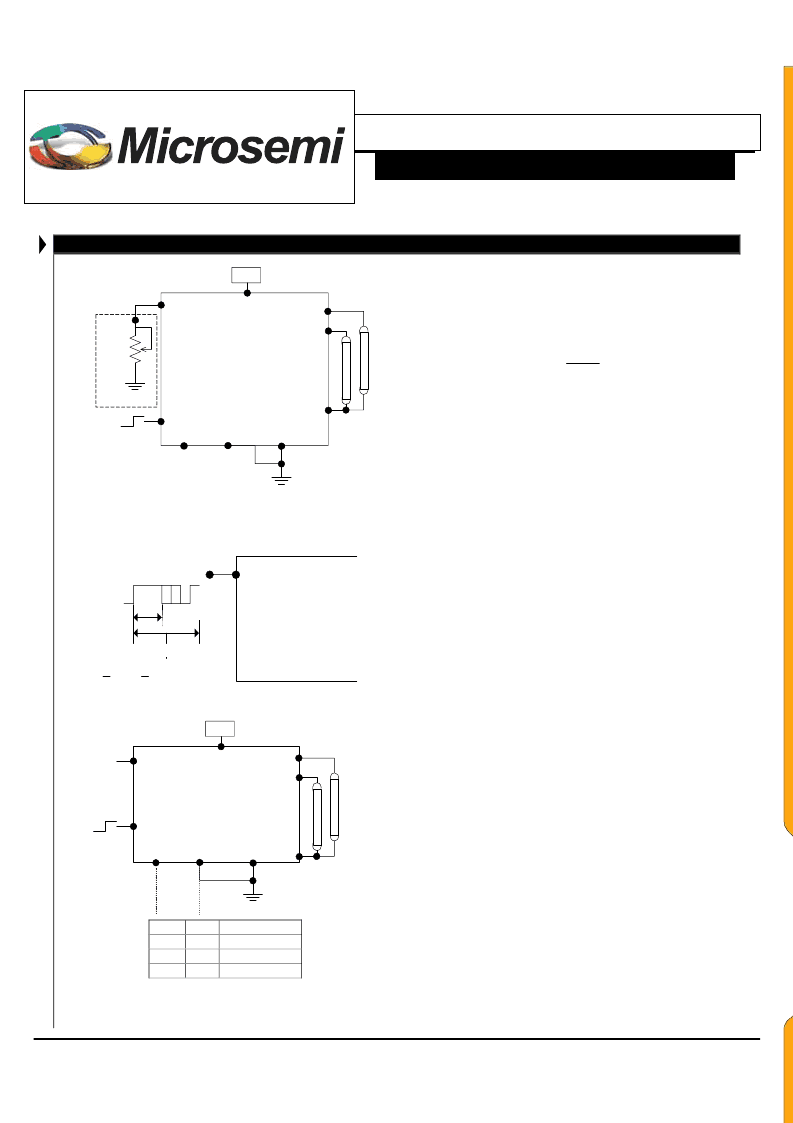- 您現(xiàn)在的位置:買賣IC網(wǎng) > PDF目錄376118 > LXMG1626-12-65 (Microsemi Corporation) 12V 10W Dual CCFL Programmable Inverter Module PDF資料下載
參數(shù)資料
| 型號: | LXMG1626-12-65 |
| 廠商: | Microsemi Corporation |
| 英文描述: | 12V 10W Dual CCFL Programmable Inverter Module |
| 中文描述: | 12V的10W的雙冷陰極可編程變頻器模塊 |
| 文件頁數(shù): | 5/6頁 |
| 文件大小: | 221K |
| 代理商: | LXMG1626-12-65 |

P
RODUCTION
D
ATA
S
HEET
Microsemi
Integrated Products
11861 Western Avenue, Garden Grove, CA. 92841, 714-898-8121, Fax: 714-893-2570
Page 5
Copyright
2005
Rev. 1.0a, 2006-11-16
W
M
.
C
PanelMatch
LXMG1626-12-65
12V 10W Dual CCFL Programmable Inverter Module
TM
T Y P I C A L A P P L I C A T I O N
LXMG1626-12-65
12V
SET
2
GND
V
HI2
V
LO
BRITE
V
IN1
SLEEP
SET
1
500K
DAC or
Pot
NC
NC
V
HI1
Figure 1
– Brightness Control
(Output current set to maximum)
PWM Signal
from System
P.W.
5μs to 200μS
BRITE
LXMG1626-12-65
0 < P.W. < 100% of period
Figure 1A
– PWM Brightness Control
LXMG1626-12-65
SET
2
GND
V
HI2
V
LO
SLEEP
SET
1
BRITE
12V
V
IN1
V
HI1
L
L
H
H
L
H
L
H
10mA
RMS
11mA
RMS
12mA
RMS
13mA
RMS
L=GND; H=Open
Figure 2
– Max Output Current
(SET
1
and SET
2
Inputs)
The brightness control may be a voltage output DAC or
other voltage source, a digital pot or 500K manual pot. The
inverter contains an internal 215K pull-up to 3V to bias the
pot. A 3.3V Logic Level PWM signal from a micro-
controller may also be used as shown in Figure 1A.
If you need to turn the inverter ON/OFF remotely, connect
to TTL logic signal to the
SLEEP
input.
Connect V
HI1
and V
HI2
to high voltage wires from the
lamps. Connect V
LO
to the low voltage wire lamp return
(wire with thinner insulation). Never connect V
LO
to
circuit ground as this will defeat lamp current regulation.
If both lamp wires have heavy high voltage insulation,
connect the longest wire to V
LO
. This wire is typically
white.
Use the SET
1
and SET
2
(see Figure 2) inputs to select the
desired maximum output current. Using these two pins in
combination allows the inverter to match a wide variety of
panels from different manufactures. Generally the best
lamp lifetime correlates with driving the CCFL at the
manufactures nominal current setting. However the SET
1
and SET
2
inputs allow the user the flexibility to adjust the
current to the maximum allowable output current to
increase panel brightness at the expense of some reduced
lamp life.
Although the SET pins are designed such that just leaving
them open or grounding them is all that is needed to set the
output current, they can also be actively set. Using an open
collector or open drain logic signal will allow you to
reduce the lamp current for situations where greater dim
range is required, as an example in nighttime situations. In
conjunction with a light sensor or other timer the panel
could be set to higher brightness (maximum output
current) for daytime illumination and lower brightness
(minimum or typical output current) at nighttime. Since
the dim ratio is a factor of both the burst duty cycle and the
peak output current, using this technique the effective dim
ratio can be increased greater than the burst duty cycle
alone. Conversely, the SET inputs could be used to
overdrive the lamp temporarily to facilitate faster lamp
warm up at initial lamp turn on. Of course, any possible
degradation on lamp life from such practices is the users
responsibility since not all lamps are designed to be
overdriven.
The inverter has a built in fault timeout function. If both
outputs are open (lamps disconnected or broken) or shorted
to ground the inverter will attempt to strike the lamp for
number of cycles. After about one to two seconds without
success the inverter will shutdown. In order to restart the
inverter it is necessary to toggle the SLEEP input or cycle
the V
IN1
input supply
A
P
P
L
I
C
A
T
I
O
N
相關(guān)PDF資料 |
PDF描述 |
|---|---|
| LXMG1643-12-61 | 12V Quad 6W CCFL Programmable Inverter Module |
| LXMG1643-12-62 | 12V Quad 6W CCFL Programmable Inverter Module |
| LXMG1643-12-63 | 12V Quad 6W CCFL Programmable Inverter Module |
| LXMG1643-12-64 | 12V Quad 6W CCFL Programmable Inverter Module |
| LXMG1644-12-61 | 12V Quad 6W CCFL Programmable Inverter Module |
相關(guān)代理商/技術(shù)參數(shù) |
參數(shù)描述 |
|---|---|
| LXMG1626-12-66 | 功能描述:MOD INVERTER CCFL DUAL 10W 12V RoHS:是 類別:光電元件 >> 反相器 系列:PanelMatch™ 標(biāo)準(zhǔn)包裝:100 系列:- 輸入電壓:6.0V 輸出:900V 類型:用于 CCFL 和 UV 燈的逆變器 尺寸/尺寸:2.34" L x 0.35" W x 0.35" H(59.5mm x 9mm x 8.9mm) 安裝類型:底座安裝 |
| LXMG1626-12-67 | 功能描述:MOD INVERTER CCFL DUAL 10W 12V RoHS:是 類別:光電元件 >> 反相器 系列:PanelMatch™ 標(biāo)準(zhǔn)包裝:100 系列:- 輸入電壓:6.0V 輸出:900V 類型:用于 CCFL 和 UV 燈的逆變器 尺寸/尺寸:2.34" L x 0.35" W x 0.35" H(59.5mm x 9mm x 8.9mm) 安裝類型:底座安裝 |
| LXMG1627-05-41 | 功能描述:MOD INVERTER CCFL DUAL 4W 5V RoHS:是 類別:光電元件 >> 反相器 系列:PanelMatch™ 標(biāo)準(zhǔn)包裝:100 系列:- 輸入電壓:6.0V 輸出:900V 類型:用于 CCFL 和 UV 燈的逆變器 尺寸/尺寸:2.34" L x 0.35" W x 0.35" H(59.5mm x 9mm x 8.9mm) 安裝類型:底座安裝 |
| LXMG1627-05-42 | 功能描述:MOD INVERTER CCFL DUAL 4W 5V RoHS:是 類別:光電元件 >> 反相器 系列:PanelMatch™ 標(biāo)準(zhǔn)包裝:100 系列:- 輸入電壓:6.0V 輸出:900V 類型:用于 CCFL 和 UV 燈的逆變器 尺寸/尺寸:2.34" L x 0.35" W x 0.35" H(59.5mm x 9mm x 8.9mm) 安裝類型:底座安裝 |
| LXMG1627-05-44 | 功能描述:MOD INVERTER CCFL DUAL 4W 5V RoHS:是 類別:光電元件 >> 反相器 系列:PanelMatch™ 標(biāo)準(zhǔn)包裝:100 系列:- 輸入電壓:6.0V 輸出:900V 類型:用于 CCFL 和 UV 燈的逆變器 尺寸/尺寸:2.34" L x 0.35" W x 0.35" H(59.5mm x 9mm x 8.9mm) 安裝類型:底座安裝 |
發(fā)布緊急采購,3分鐘左右您將得到回復(fù)。